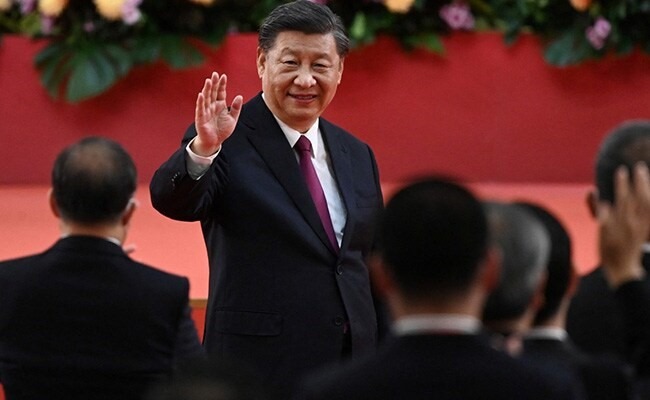| Translate This News In |
|---|
Xi Jinping is expected to win a historic third term as president and solidify his position as the nation’s most powerful leader since Mao Zedong at the five-yearly conference of China’s ruling Communist Party, which will begin on October 16.
The congress, which usually lasts a week and takes place primarily behind closed doors at the Great Hall of the People on the western side of Tiananmen Square in the heart of Beijing, received the official start date from the Politburo on Tuesday.
Since taking over as party general secretary ten years ago, Xi, 69, has progressively increased his hold on the reins of authority, eradicating any known factional opposition to his reign. At a Congress that many China watchers compare to a coronation, Xi is anticipated to exercise mostly unopposed control over important appointments and policy directives.
Xi is poised to secure a mandate to carry out his lofty vision for the “rejuvenation of the Chinese nation” for years to come, despite the challenges that have buffeted his path to a third term, including a stagnant economy, the COVID-19 pandemic, rare public protests, rising frictions with the West, and tensions over Taiwan.
Since taking office, Xi, the son of a communist revolutionary, has consolidated the party’s position in society, reduced room for criticism, and strengthened the party.
As the head of the developing world and a rival to the U.S.-led, post-World War Two system, China has also grown far more assertive on the international stage under Xi.
Steve Tsang, head of the University of London’s SOAS China Institute, predicted that he will lead China to a more Sino-centric approach to policy, especially foreign affairs. He will emphasise how crucial it is for the Chinese Communist Party to take charge of all affairs and for the party to fully support its leader, according to Tsang.
Xi’s anticipated ascent to a third five-year term, and maybe more, was established in 2018 when he abolished the presidency’s two-term restriction. The post will be up for renewal during the annual legislative meeting in March.
The People’s Daily, the party’s official newspaper, published an infographic on its website on Wednesday outlining Xi’s vision, which included one of his catchphrases: “Party, government, military, people, education; east, south, west, north, central: the party leads everything.”
Important People
Xi is anticipated to receive the titles of Chairman of the Central Military Commission and General Secretary of the Communist Party the day following the 20th Party Congress.
Key results from the Congress will be on personnel, including who joins Xi on the Politburo Standing Committee (PSC) and who succeeds Premier Li Keqiang, who is scheduled to retire in March. There isn’t expected to be much of a change in overall policy direction.
Wang Yang, 67, the president of a significant political advisory body, and Hu Chunhua, 59, a deputy premier, are candidates for the position of premier, which is responsible for managing the economy. Previous to each other, Guangdong, a powerful province in the south, had both of them as its Communist Party leader.
Chen Min’er, a Xi disciple who is party chairman of the sizable municipality of Chongqing but has never held a national office, is another candidate for the position of premier. Chen is 61 years old.
The composition and size of the upcoming PSC, which already has seven members, will also be extensively scrutinised.
While the idea of “factions” in Chinese politics appears to have virtually vanished under Xi, two current members have reached the conventional retirement age, so observers of China will be looking to see if the addition of any new member signals a desire to allow various opinions.
Alfred Wu, an associate professor at the Lee Kuan Yew School of Public Policy at the National University of Singapore, stated that after placing his supporters in positions of authority with this party conference, Xi will have a stronger mandate to enact any policies he desires.
Away From The Congress
Many people in China and around the world will be watching Beijing’s efforts after the congress to prevent a protracted economic downturn, which increases the possibility that COVID curbs will be eased, though limitations such as the absence of more effective mRNA vaccines and the absence of widespread immunity among China’s 1.4 billion people still exist.
China has become an anomaly in the world because to Beijing’s rigorous “dynamic zero” COVID policy, which has resulted in frequent and disruptive lockdowns that annoy residents and damage the country’s economy.
Investors will also be watching to see how Beijing handles deteriorating ties with the West.
During a third term, attention will also be focused on Xi’s avowed goal to subjugate Taiwan to Beijing, especially given the heightened polarisation following U.S. House Speaker Nancy Pelosi’s recent trip to Taipei. China’s assertions of sovereignty are categorically denied by Taiwan’s democratically elected government.
Since coming into power, Xi has put an end to dissent in the formerly unrest-ridden regions of Tibet and Xinjiang and subdued Hong Kong with a comprehensive national security law.
There is little indication that society is getting ready for such a high-risk move and the fallout, such as harsh Western sanctions, that it would cause. Few China analysts anticipate Beijing to make a military move on Taiwan anytime soon.
But Xi believed that by effectively resolving the “Taiwan dispute,” he would join Mao in Chinese history.


















